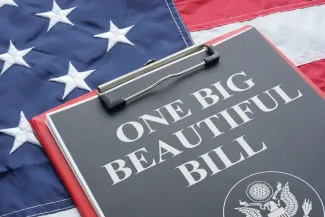
The Big & The Beautiful
With all the drama of a classic soap opera, the One Big Beautiful Bill Act (OBBBA), a sweeping tax bill, was recently signed into law. It has made waves in the news and media as another tax-break for the rich, but is that really true?
There are always going to pros and cons to any new legislation, depending on your tax status and income, so what are the key aspects of the bill and what other lesser known pieces could have an impact?
Here are the big headlines:
The tax rates from the 2017 Tax Cuts and Jobs Act (TCJA) are now permanent, instead of sun-setting at the end of 2025. This means the current seven tax brackets will remain unchanged. According to the Strategas Research, making many of the provisions from the 2017 TCJA permanent will help middle class families avoid a $400 billion tax increase.
The standard deduction remains in place and made permanent at $15,700 and $31,500 single and married tax-payers in 2025 with an additional $6,000 and $12,000 temporarily for single and married seniors over age 65 through 2028. The standard deduction will adjust annually for inflation.
The gift and estate tax exclusions are also being made permanent at $15M per individual and $30M for married couples with an annual inflation adjustment.
The non-refundable child tax credit is increasing to $2,200 in 2025 and the refundable tax credit of $1,400 remains. Both are being made permanent and adjusted annually for inflation.
According to Strategas Research, making many of the provisions from the 2017 TCJA permanent will help middle class families avoid a $400 billion tax increase.
Here are some key extras:
A temporary increase on the annual federal deduction for state and local taxes (SALT) up to $40,000 through 2029, from a cap of $10,000 previously. This could be big benefit to people living in high-tax states such as New York and California. Subject to certain income threshold phase outs.
Tip and overtime income of up to $25,000 can be deducted, even without itemizing, through 2028. Subject to certain income threshold phase outs.
Car loan interest deduction, even without itemizing, beginning in 2025 through 2028 for qualified vehicles that had final assembly in the United States. Subject to certain income threshold phase outs.
A new tax-free savings account for minors, called Trump accounts that will allow annual contributions of up to $5,000 until age 18. Provides a tax credit of $1,000 for opening up a new account for children born between Jan. 1, 2025 and Dec. 31, 2028. Employer contributions are allowed and not included in employee income.
Let us know if you’re interested in discussing these changes and how they may impact your financial plan. We’d love the opportunity to help your family plan, save, and invest well.

